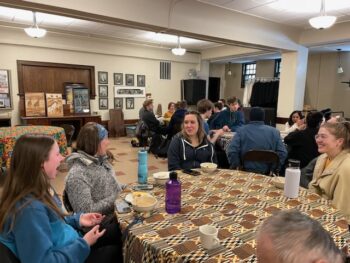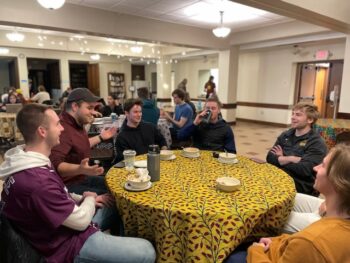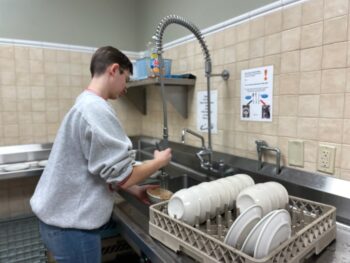By Pastor Paul Lutter
Amid COVID19’s lingering impact, leaders of Lutheran Campus Ministry – Twin Cities (LCM-TC) had to ask themselves a difficult set of questions related to their free weekly noon soup meal that they had hosted during the school year on Tuesdays for more than 15 years. While the meal had historically served 5 to 25 people each week, the numbers had seriously diminished. Would the meal that fed students, faculty, staff, and anyone else who were hungry for food and community need to end? Would LCM-TC then need to wait to see what would come next?
In some ways, these questions are nothing new to LCM-TC. As the Rev. Kate Reuer Welton, the campus pastor of Lutheran Campus Ministry – Twin Cities, points out, the only thing that hasn’t changed in this ministry is the centrality of Word and Sacrament. She offered, “What changes from year to year is in terms of how students live out their faith.”
“Bring soup, bring money, bring your bellies. And bring your hearts.”
Lutheran Campus Ministry equips student leaders with practices of discernment, and then comes alongside them with support and accountability as they discover how to actualize their intuition about what God might be calling the ministry into. As a result, the whole leadership team embraces agility, which includes a willingness to let go, as well as an openness to learn to trust God.
Around the questions about the future of the free soup meal, students “fought for it. [Students] asked for more time to see what it could become with a little more attention,” Reuer Welton pointed out. As a result, staff and students worked together to come up with this mission: “a place for hungry bodies and spirits.” From this came the name “be fed.” Staff collaborated with students who met with student groups that were focused on food insecurity and posted at the health sciences buildings around Grace University Lutheran Church in Minneapolis, where LCM-TC and be fed are housed.
WHEN THE MEAL BEGAN last fall, student leaders stood outside the congregation, on the corner of Harvard and Delaware, where they invited those who passed by to join them for bagels and conversation. Weekly, the student leaders would pass out between 60 and 100 bagels. Knowing the skeptical stance many took toward the church, the student leaders asked participants and passersby, “[W]hat would make it more comfortable for [you] to enter a church building?”
 Thomas Atkins, a student leader who will soon graduate with a degree in Computational Biology will head to Princeton University in the fall to earn a PhD. He said he thinks the fact that this began by building relationships with community outside the church was important in be fed’s success. “We are here to give … food and provide space, instead of other groups trying to proclaim their beliefs.”
Thomas Atkins, a student leader who will soon graduate with a degree in Computational Biology will head to Princeton University in the fall to earn a PhD. He said he thinks the fact that this began by building relationships with community outside the church was important in be fed’s success. “We are here to give … food and provide space, instead of other groups trying to proclaim their beliefs.”
“The LCM-TC leadership team embraces agility, which includes a willingness to let go, as well as an openness to learn to trust God.”
Eventually, once the weather cooled, both the leaders and those who received the bagels came inside. Once they did, between 50 and 75 people – students, community members, and anyone who would like a warm meal and conversation – moved inside with them.
Boysen Olson, a sophomore in Biology, Society, and the Environment and one of the student leaders who helped push for the meal to continue, said, “There’s still hunger, both literal and figurative.” When asked what brings people through the door to receive the meal in the basement of a church building, he responded, “Good food – donated soups and other food – smiling faces, open seats, good conversation, if they want it. We’re not pushing an agenda. First and foremost, this is a place to be fed. If you want to join in a larger community, you can, but it’s not expected.”
Something Atkins has learned through the evolution of be fed came from a quotation of a medical student: “’This space is the only time in our week where we can breathe, and not have to study.’” Atkins heard this as a “reinforcement of the need for [third] spaces which provides a counternarrative: sit, eat, talk, not go, go, go. This counternarrative is lived out once a week.”
MOLLY ROETTGER, A second-year DDS student, first came to know about be fed because she was hungry. Classmates told her about this once-a-week meal in which everyone and anyone was invited to eat and participate in conversation with no strings attached.
She was surprised that the community welcomed her, and yet didn’t ask questions about whether she was religious or not. “They were non-judgmental,” she said. “You don’t have to be a member,” she said. “The doors are open and our bowls are full.” This was underscored by each of the people I spoke with: “There are no strings attached.”
Roettger pointed out, “Having food for people in need really speaks volumes about our values. We do this to serve [anyone and everyone in the] community.” For her, this means, “Maybe those who come don’t always feel God’s love. But maybe now, because of this meal and those with whom they converse if they want, they see God’s love.” According to Roettger, “This is more than a soup kitchen. It’s a second home, in a sense.”
“This space is the only time in our week where we can breathe, and not have to study.”
Olson and Atkins both hope be fed will continue to grow. Roettger invites us to come and see what God is up to in be fed: “Bring soup, bring money, bring your bellies. And bring your hearts.”
The Lutheran Campus Ministry – Twin Cities will experience a decrease in financial support from the Minneapolis Area Synod due to the downturn in benevolence giving (mission support) from congregations. The synod budget currently reflects a 10% hold on the annual commitment to LCM-TC and six other partner ministries until it is clear that the synod budget is fully funded, at which time the added 10% would be freed up for the ministry partners.
Congregational support for the work of Lutheran Campus Ministry-Twin Cities can be made to the synod through mission support as part of being church together, or direct gifts can be provided to LCM-TC. In addition to financial support, LCM-TC also welcomes volunteers to bring soup for the be fed ministry. Those interested in learning how to help can contact the Rev. Reuer Welton.
Paul Lutter is interim pastor of Peace Lutheran Church in Plymouth, Minnesota.
